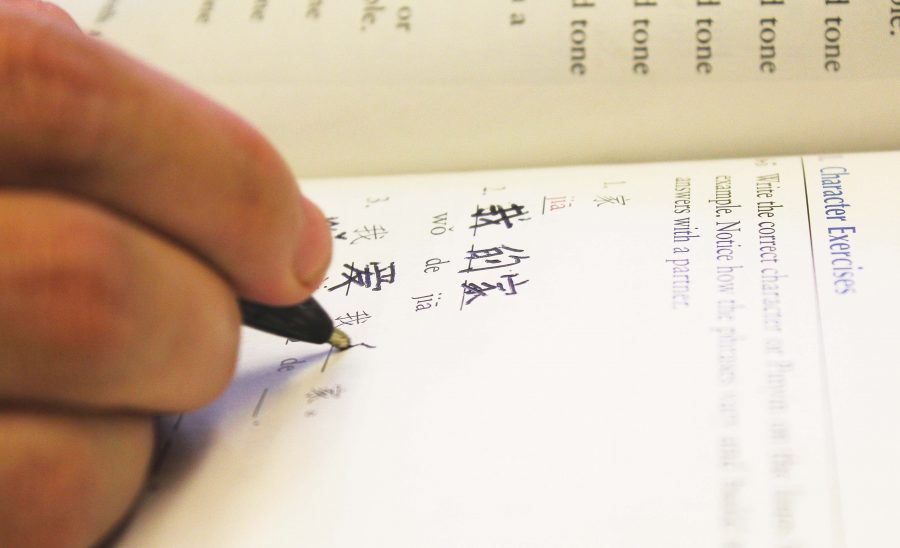While presidential candidates squabble over if China is a “currency manipulator,” one point is settled: Mandarin Chinese is the most widely spoken language in the world- and it’s growing.
“I look at the global market today to see where the future is going,” UA junior and President of the UA Chinese Culture Club, Peter Huang said. “And even though the growth in China is slowing down, it’s still growing.”
Huang and many students across the United States have taken notice of the Chinese language’s global expansion and have decided to learn the language.
According to Bloomberg’s 2011 ranking of the world’s top business languages, (other than English) Chinese placed first over French, Arabic and Spanish. The rankings took into account the language’s popular and geographical presence and the educational and literacy rates and financial power surrounding its distribution.
As a student majoring in finance, Huang began his venture into the Chinese language and UA Chinese classes for their practicality. He cited the advantages of having Chinese proficiency on a resume and in a workplace as a huge force behind the growth of the language in the United States.
“The language itself is so unique,” Huang said. “And the changes that are happening are so dramatic. Ten to 30 years from now Chinese will be the biggest international language in the world.”
The Chinese Culture Club aims to share knowledge from Chinese and American cultures while facilitating opportunities for Chinese exchange students and local UA students to break out of their respective social bubbles he said. In support of this notion, the club created a biweekly, and often bilingual, conversation hour in the Ferguson Starbucks two months ago.
Xiang Zhang, who attained her Ph.D. in bilingual education from the University, teaches Chinese 101 and 102 and directs the Chinese study abroad program on campus.
Zhang came to the United States from China for college and has since devoted herself to sharing her knowledge of Chinese culture and language to American students.
“As a linguist I’d say because it’s so beautiful,” Zhang said. “But, realistically it’s grown because China has developed so well and so quickly.”
She acknowledged that there’s an intimidation factor that’s inherent to the tonal nature of the spoken language and the unfamiliar aspects of character writing, but assured the difficulty is found in perception more than reality.
“Students must come in thinking, ‘I’m going to be studying something new,’” Zhang said. “This is a totally unique language to English speakers.”
Through the university summer abroad experience she leads, UA-in-China, students can expand their knowledge through a program centered at Xiamen University and stretching to areas around Gulang, Xi’an and Bejing Zhang.
She said she was amazed by how her student’s descriptions of China or the Chinese people shifted towards authentic descriptions of their experiences and away from sweeping statements and stereotypes after their return. She said that on Nov. 7 at 4:30 p.m. in Crossroads at the Ferguson Center, a panel of Chinese and American students will share their experiences abroad for interested students.
Austin Lafferty, a fifth-year senior majoring in philosophy, transferred to the University from Florida College in Tampa knowing he’d be spending a majority of his next summer in Jing Yu, China.
Lafferty said his preacher’s wife was friends with a Chinese couple running an English language school in rural China. The prospect of volunteering there intrigued him.
“I’ve always loved the idea of learning languages and traveling, and I’d never been out of the country before,” Lafferty said. “I thought it’d be an amazing opportunity.”
In preparation Lafferty enrolled in Chinese 101. Though confident, he was wary of the language’s reputation for difficulty.
“When you first see the characters, all you see are sort of these random squiggles and you’re just memorizing it,” Lafferty said. “But you start to see the patterns and repeating the patterns in use.”
Two semesters later he left for his 2011 summer abroad at David’s English Academy. Living with the family of three running the academy, Lafferty devoted his weekdays to study and homework and weekends to teaching students.
This past summer, Lafferty returned to China to backpack around the country. He said he was considering taking a year following his graduation to again volunteer in the country and take his interest in human right law to help Chinese speakers wherever he finds himself.
Huang considered his own aspirations and said he was confident he could make use of Chinese in most any future business environment.
“If you take the chance to learn Chinese, you’re only benefiting yourself,” Huang said. “It will benefit you personally, at your job and in every aspect of life.”









